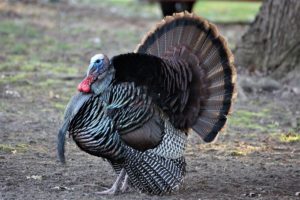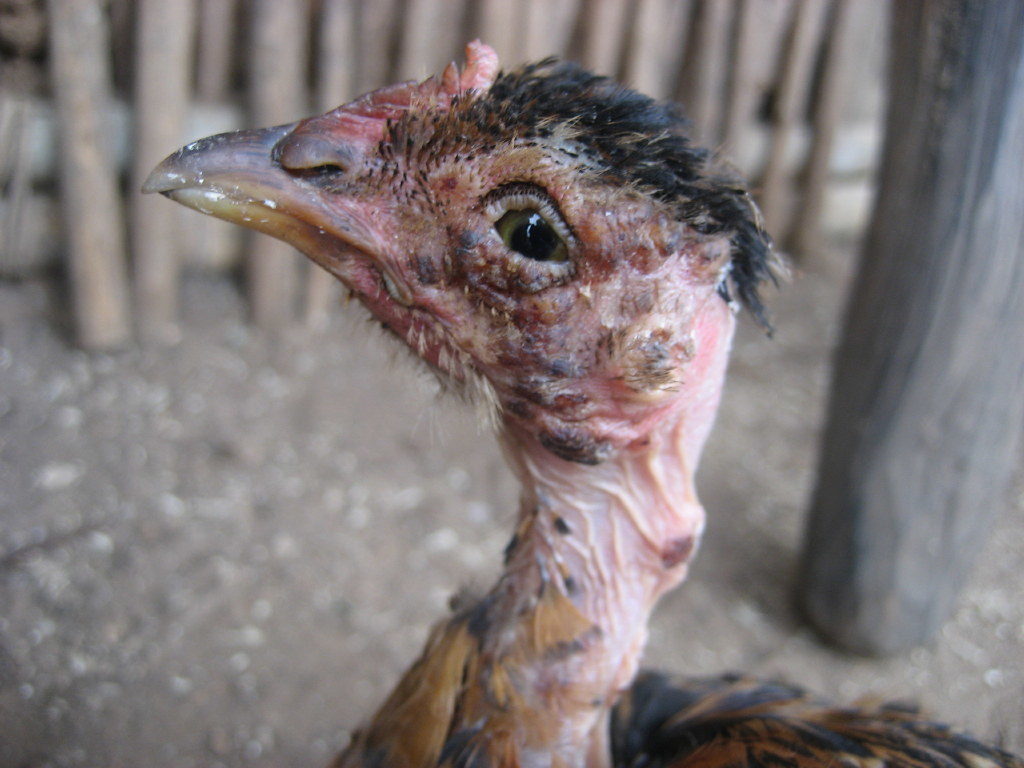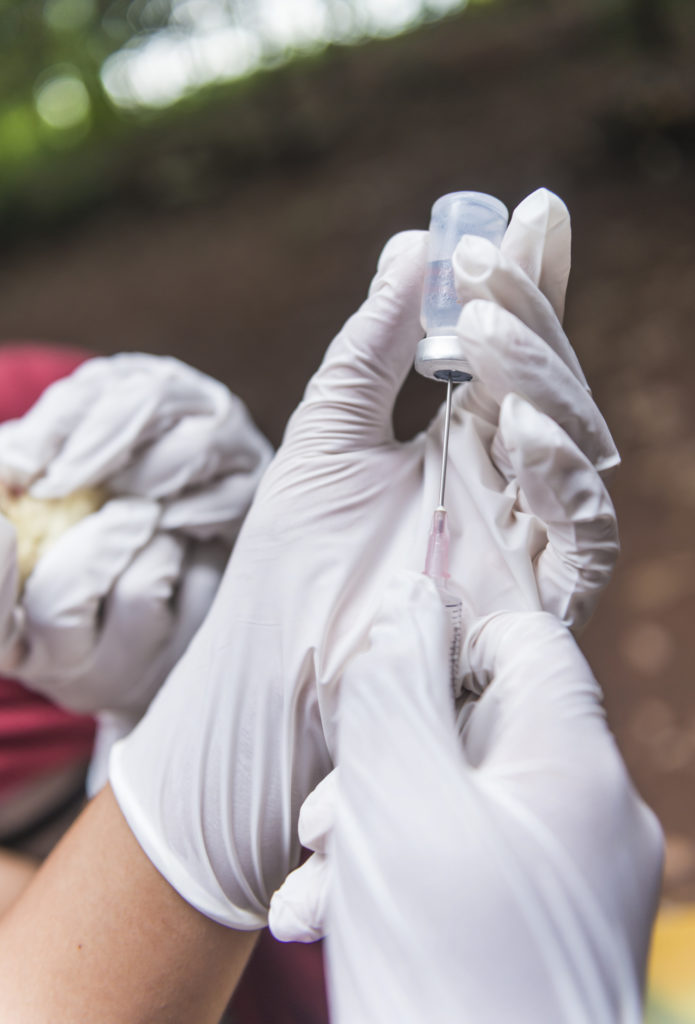Turkeys are pretty healthy birds, but they can catch some diseases. Luckily, you can vaccinate your birds for many of them.
Turkey Diseases
Turkeys are generally healthy birds. Most backyard farmers will tell you while the birds may be fragile for the first couple of weeks, they grow into robust adults with few health problems.
These turkey diseases are most commonly found on farms with large numbers of turkeys and poor biosecurity practices. Talk to your veterinarian and find out which vaccines your turkeys need.
Here are six turkey diseases that you need to be aware of. If any of these diseases affects your area then you’ll want to set up a vaccination program as a form of prevention.

Erysipelas
Erysipelas is a disease that is caused by the bacterium Erysipelothrix rhusiopathiae.
The disease most often results in septicemia and it occurs in domestic fowl, wild birds, reptiles and amphibians.
Erysipelas spread rapidly and can have up to a 50% mortality rate. The bacteria can also affect the fertility of males, significantly decreasing sperm counts.
The bacteria is shed through feces, which can then infect the turkey’s housing and/or environment. Erysipelas is very hard to get rid of once it’s in the soil or on the ground. If you flock become infected, you may need cull the whole flock. Or to re-house the survivors as erysipelas isn’t killed by common household cleaners such as bleach.
Luckily, you can easily protect your flock through antibiotic vaccinations, either directly or through drinking water. There are two types of vaccines: a traditional vaccine and a live vaccine that can be put into the drinking water. The live vaccine in drinking water is the least stressful for the turkeys and is easier on the people handling the turkeys.
Vaccines for erysipelas must be repeated frequently because vaccines for bacterium do not have the long immunity that vaccines for viruses do.
Expect to give the vaccine as often as every 2-3 weeks.
Fowlpox
Fowlpox is a viral infection that affects turkeys (and chickens) worldwide. It’s an avipoxvirus in the Poxviridae family.
A slow spreading disease, fowlpox causes lesions typically on unfeathered skin such as combs and legs, though is can also affect feathered skin in some birds. The diptheric form of fowlpox can also create lesions on the mucous membranes of the mouth, esophagus, larynx, and trachea.

Fowlpox on young turkey. Flickr
The virus is spread through open wounds or abrasions on the skin. When turkeys shed infected lesions, these can infect other turkeys. Mosquitoes and other blood sucking pests can also transmit the disease. An extensive infection will decrease egg production in your flock, but for birds with skin lesions alone, mortality rates are low. Diphtheritic infections often result in more deaths through secondary respiratory or gastric infections.
Turkeys living in areas where fowlpox is present should be vaccinated within the first couple weeks of life and again at 12-16 weeks.
Hemorrhagic enteritis
The GI virus is part of the Adenoviridae family and occurs most commonly in young turkeys 6 to 12 weeks old. If your birds become infected, you’ll see bloody feces and your birds will be lackluster.
These days, turkeys are routinely vaccinated for hemorrhagic enteritis, so mortality rates are pretty low. It’s most often found in areas where there are large commercial turkey (or pheasant) operations.

Vaccines can be given with a subcutaneous injection or through the drinking water. Vaccines that are intended for pheasants should not be given to turkeys and vice versa.
Newcastle Disease
Newcastle disease is caused by the Newcastle disease virus (NDV) and is synonymous with avian paramyxovirus, a pathogen that most affects poultry. The virus is present worldwide and can affect many species of poultry.
The virus is endemic in Asia, Africa and the Americas. Currently, the California is still recovering from the spring 2019 outbreak, and though there have been no new positive detections of VND since early September, 2019, the Regional Quarantine is still in place as of October 2019.
Newcastle disease most often presents with acute respiratory distress, though some birds exhibit neuromuscular spasms and/or diarrhea. The disease spreads rapidly and is usually through respiratory proximity to infected birds or their feces. Wild birds are often the vector that infects domestic livestock.
This is a disease with a rapid onset: 2-12 days after initial aerosol exposure. Visible symptoms will vary depending on the strain of virus and which system it attacks first: respiratory, digestive, or nervous. Coughing, sneezing, and wheezing are common for respiratory presentation. Nervous symptoms include tremors, paralysis of wings and legs, twisted necks, circling and clonic spasms.
Vaccines are available for turkeys, chickens, and pigeons, which will produce an antibody response. Live vaccines can be introduced to the flock through food or water while inactive vaccines require individual injections.
Newcastle disease is a required reportable virus. If you think your flock may be infected, contact local vets and your state extension office. Isolate your birds, especially from contact with wild birds like sparrows and doves who may be sneaking snacks from open feeders, so that your flock can be tested.
Turkey Coryza
Turkey Coryza, or Bordetellosis, is caused by the Bordetella avium rhinotracheitis bacteria.
Bordetellosis causes an infection in the respiratory tract. This infection itself isn’t usually fatal but can cause open wounds and lesions, which can lead to secondary infections from E. coli and other bacteria. When secondary infections are present, the mortality rate can jump from 0% to nearly 40%.
Turkey coryza is highly infectious and can be spread through direct contact, contaminated drinking water, feed and even infected litter (which can remain infectious for one to six months.)
Symptoms usually show up 7-10 days after the initial infection and you’ll notice a clear nasal discharge, especially if you push on the bird’s nares. They can also suffer from watery eyes, a slight cough, and altered vocalizations. Your birds will sound like they have a cold.
Treatment with antimicrobial agents hasn’t been very effective and even live vaccines have had mixed results. Turkeys over 3 weeks can get a vaccine for coryza though it’s not commonly given to breeding animals, therefore immunity is formed after infection has occurred.
The best way to avoid turkey coryza is through good biosecurity before any infections show up and rigorous disinfection if they do. Luckily, most common disinfectants are effective for killing Bordetellosis.
Fowl Cholera
Fowl cholera is a serious disease that is caused by the bacterium Pasturella multocida. It can affect many types of poultry, including turkeys, chickens, and ducks.
Fowl cholera has a very high mortality rate, sometimes killing all of the birds in a flock. Symptoms include depression (lack of activity), oral discharge, diarrhea, ruffled feathers and respiratory distress from pneumonia (most commonly seen in turkeys.) Unfortunately, fowl cholera can also be asymptomatic. Wild birds can transmit the disease, along with pigs, rodents, dogs and cats.
The bacterium is usually shed through infected body fluids like saliva or feces that enter the environment. Once in the environment, it can spread quickly. Keep in mind that it is susceptible to ordinary disinfectants, sunlight, drying, and heat. So your best defense is a good offense. Reduce the rodent population by limiting free-food areas, clean up feces regularly and disinfect as needed.
Vaccines are available for healthy flocks and can be used to boost a good biosecurity plan. Antibiotics may reduce the mortality rate, but won’t eradicate the bacteria from a flock. Eradication requires culling your flock of infected birds, followed by thorough cleaning and disinfecting.
Have other turkey problems? Figure out what’s going on with your turkeys here.

Shelby DeVore is a livestock expert with experience teaching high school agriculture and multiple poultry science teams. Shelby has over 20 years of experience raising poultry for show, meat and eggs. She lives on a farm in west Tennessee with her husband and two children along with too many chickens and turkeys to count. You can catch up with her on her homesteading blog, Farminence.













6 Comments
I want to be provided with the vaccination schedule for turkeys
COULD YOU LIST SOME GENERIC MED’S FOR THESE DISEASES?
LIKE OTC – OVER THE COUNTER?
WOULD SULPHER IN THERE WATER FOR EXAMPLE?
I AM NOT SPENDING $100 TO GO TO THE VETS – WAY TOO MUCH$$$$
my turkey is having boil on one side face, which vaccine can I give
What are the best antibiotics for turkey
One of my Turkey is having a swollen anus that make excretion difficult, what type of drugs do I use
You would really need to contact a veterinarian for information about the best medication for your birds. In the meantime, be sure to keep the turkey’s vent clean.